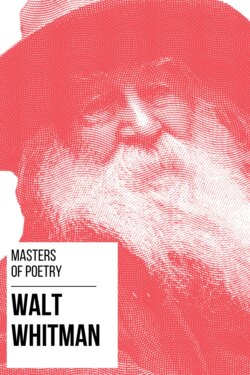Читать книгу Masters of Poetry - Walt Whitman - August Nemo, John Dos Passos, Ellen Glasgow - Страница 31
На сайте Литреса книга снята с продажи.
XII
ОглавлениеWalt Whitman was of the people, the common people, and always gave out their quality and atmosphere. His commonness, his nearness, as of the things you have always known,—the day, the sky, the soil, your own parents,—were in no way veiled, or kept in abeyance, by his culture or poetic gifts. He was redolent of the human and the familiar. Though capable, on occasions, of great pride and hauteur, yet his habitual mood and presence was that of simple, average, healthful humanity,—the virtue and flavor of sailors, soldiers, laborers, travelers, or people who live with real things in the open air. His commonness rose into the uncommon, the extraordinary, but without any hint of the exclusive or specially favored. He was indeed "no sentimentalist, no stander above men and women or apart from them."
The spirit that animates every page of his book, and that it always effuses, is the spirit of common, universal humanity,—humanity apart from creeds, schools, conventions, from all special privileges and refinements, as it is in and of itself in its relations to the whole system of things, in contradistinction to the literature of culture which effuses the spirit of the select and exclusive.
His life was the same. Walt Whitman never stood apart from or above any human being. The common people—workingmen, the poor, the illiterate, the outcast—saw themselves in him, and he saw himself in them: the attraction was mutual. He was always content with common, unadorned humanity. Specially intellectual people rather repelled him; the wit, the scholar, the poet, must have a rich endowment of the common, universal, human attributes and qualities to pass current with him. He sought the society of boatmen, railroad men, farmers, mechanics, printers, teamsters, mothers of families, etc., rather than the society of professional men or scholars. Men who had the quality of things in the open air—the virtue of rocks, trees, hills—drew him most; and it is these qualities and virtues that he has aimed above all others to put into his poetry, and to put them there in such a way that he who reads must feel and imbibe them.
The recognized poets put into their pages the virtue and quality of the fine gentleman, or of the sensitive, artistic nature: this poet of democracy effuses the atmosphere of fresh, strong Adamic man,—man acted upon at first hand by the shows and forces of universal nature.
If our poet ever sounds the note of the crude, the loud, the exaggerated, he is false to himself and to his high aims. I think he may be charged with having done so a few times, in his earlier work, but not in his later. In the 1860 edition of his poems stands this portraiture, which may stand for himself, with one or two features rather overdrawn:—
"His shape arises
Arrogant, masculine, naïve, rowdyish,
Laugher, weeper, worker, idler, citizen, countryman,
Saunterer of woods, stander upon hills, summer swimmer in rivers or by the sea,
Of pure American breed, of reckless health, his body perfect, free from taint from top to toe, free forever
from headache and dyspepsia, clean-breathed,
Ample-limbed, a good feeder, weight a hundred and eighty pounds, full-blooded, six feet high, forty inches
round the breast and back,
Countenance sunburnt, bearded, calm, unrefined,
Reminder of animals, meeter of savage and gentleman on equal terms,
Attitudes lithe and erect, costume free, neck gray and open, of slow movement on foot,
Passer of his right arm round the shoulders of his friends, companion of the street,
Persuader always of people to give him their sweetest touches, and never their meanest.
A Manhattanese bred, fond of Brooklyn, fond of Broadway, fond of the life of the wharves and the great ferries,
Enterer everywhere, welcomed everywhere, easily understood after all,
Never offering others, always offering himself, corroborating his phrenology,
Voluptuous, inhabitive, combative, conscientious, alimentive, intuitive, of copious friendship, sublimity,
firmness, self-esteem, comparison, individuality, form, locality, eventuality,
Avowing by life, manners, words to contribute illustrations of results of These States,
Teacher of the unquenchable creed namely egotism,
Inviter of others continually henceforth to try their strength against his."
